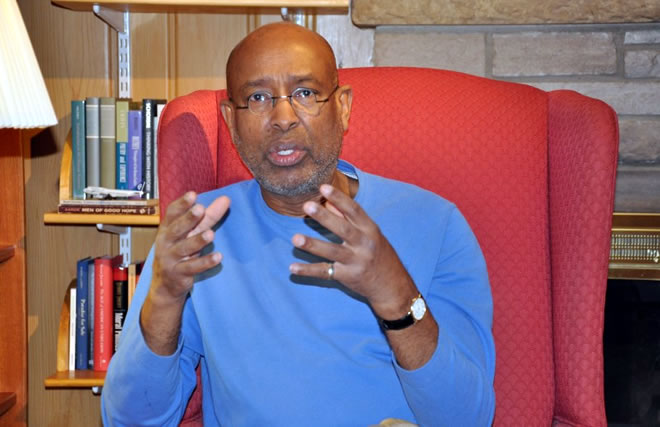
Prof. Ahmed I. Samatar
by Mohamoud A Gaildon
Wednesday, August 28, 2013
At first blush, my reaction to Professor Samater’s turnaround vis-à-vis Somaliland was similar to that of many of my fellow Northern unionists: consternation and chagrin. Upon further reflection, however, I see the episode in an entirely different light. Where I saw peril, I now see promise.
Professor Samater’s theory on Somalia has evolved over the years. I remember a time almost two decades ago when he and Professor Said Samater were on TV. And I distinctly remember Ahmed Samater’s sobering conclusion that the Somali state could not be reconstituted. In those days, many saw him as an aloof intellectual with an ivory tower approach to Somalia. Yet, there was the gradual but unmistakable shift towards dynamic engagement in matters Somali, culminating in outright political activism and an unsuccessful run for the Presidency of Somalia.
In so far as political science can lay claim to science, it ultimately should be guided by experiment, and it is in this light that I now view Professor Samater’s odyssey in Somali politics. From a cynic’s point of view, Professor Samater’s turnaround is born of the agony of defeat, which may very well be true. For the more objective observer, however, a more plausible explanation comes to mind: a thorough disenchantment with the way politics is practiced in the South. In this latter view, to which I now lean, Professor Samater’s experiment of his theory, if not his vision for Somalia, crashed miserably against the sandy back alleys of Mogadishu only to beget a new theory and, along with it, a new experiment. So, on to Hargeisa!
In Somaliland, though, Professor Samater will face a challenge of a different sort. Whereas in Mogadishu he had to brave the stealthy suicide bomber and the backroom deals, in Hargeisa he will find a system that brooks no dissent when it comes to political discourse on the question of secession, a place where not even the faintest of unionist voices is tolerated. Imagine a place where even General Jama Mohamed Ghalib, a native son of Hargeisa, senior Somali citizen, and one of the most venerated of living Somalis, cannot stand before a crowd and call for Somali unity! How a man steeped in the art of unfettered discourse, a man who made a career of the perpetual pursuit of learning, as the professor, can bring himself to accept such a closed system remains to be seen. But, if this is a daunting task, it is also an opportunity.
I am a Northerner through and through. And it is only as such that my concern goes beyond peace and Somali unity. I find unnerving the vanishing of what I call the Northern spirit which previously graced the North and gave its people a distinct character. Now, the North, formerly known for its vibrant energy, creativity, resourcefulness, lofty literature, and the graceful blend of the idyllic and the urban, stands a mere shell of its former self. The erstwhile vanguards of Somali pride and Somali selfassertion are now divided, and many have withdrawn from the larger Somali society so much so that liberty from tyranny has given way to a crippling bondage to bitterness. My fellow Northerners should know that one just cannot slough a character cultivated over centuries, a character that has served one and all so well, and expect to remain the same. For the good of all Somalis, therefore, this state which strips the Somali North of its distinct personality needs to come to an end. And it is here that the embattled Professor can help and, if successful, shine and have the last laugh over all his detractors.
Professor Samater has a golden opportunity to call and work for a genuine discourse among Northerners whether in the diaspora or back home. But to get there, he must first convince Somaliland to withdraw its forces from Las Anod. Somaliland should be made to understand that a policy that covets the land and alienates the people is bound to fail. And Professor Samater needs to understand that he has to show he is for all of the North, and not just part of it. Who knows what can happen? He may even find a way to convince Somaliland to embrace a new era of intellectual openness about secession. If Somaliland is comfortable in its own skin and confident of its position, an unlikely scenario, it should have nothing to fear from such a drastically new approach. In openness lies health, in flexibility strength. After all, that which cannot bend breaks.
So, there we go: for the professor, a new chapter, a new hypothesis, a new experiment, a new challenge, a new opportunity; for Somaliland, time to show its true intent. Let’s wait and see.
Mohamoud A Gaildon
Medical Physicist
USA
[email protected]